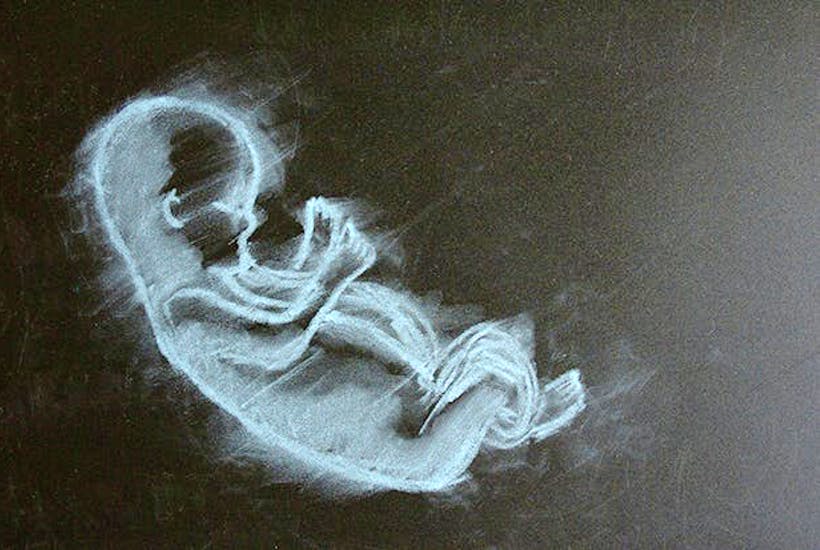The Spectator, 14 februari 2018
Auteur: Ross Clark
‘Hoe kan het dat we zwijmelen over babykuikens, kalveren, puppy’s en de rest, en toch compleet onverschillig lijken voor de grootschalige vernietiging van menselijke foetussen?’

Most of the time I feel perfectly at ease in my own country, and that would be the case had we voted Brexit or Remain, Theresa May or Jeremy Corbyn. But just occasionally Britain seems to me an utterly alien place – bizarre even. Today, Jeremy Corbyn launched his manifesto for pets. He wants to ban foie gras, make it mandatory for motorists to report that they have run over and killed cats, and pass a law giving tenants the right to keep a pet. I don’t suspect that he will encounter a great deal of opposition on these things – bar a token protest on the last from buy-to-let investors. Fox hunting aside, no political party in recent times has come to much harm by doing something to help furry, feathery or scaly animals. In the past 20 years, we have had animal laws by the dozen, controlling the use of animals in circuses and in advertising campaigns, laws against sow stalls and numerous others.
This would all be fine – I can’t say I have a problem with much of the above – if it weren’t for the utter refusal on the part of our main political parties to even discuss what seems to me a far more pressing issue for human beings: the rights of unborn children. With the honourable exception of Jacob Rees-Mogg, when did you last hear a frontline politician or even backbench MP dare to even ask whether our laws on abortion, and the practice of them, ought to be reformed (reformed, that is, in the direction of making it harder to have an abortion)? There seems to be an unwritten rule in politics that the issue must not be discussed, and that anyone holding views which are disapproving of current practice on abortion must be dismissed as an extremist or religious nutter. This is in spite of obvious evidence that abortion as conducted in Britain is completely at odds with the word of the law. Under the 1967 act that legalised abortion, it is clearly stated that it is only supposed to be used in situations where the mother’s physical or mental health is at risk or if the baby were to be born seriously handicapped. Few would even pretend that abortion is being restricted to these cases. It is over 20 years ago now, but the first question my wife’s GP asked her when she said she thought she was pregnant was: do you want the baby? There is little getting away from it: social abortion is routine in Britain, even though it is illegal. The law supposedly preventing it is treated with the same contempt as archaic laws ordering us to do archery practice.
There seems to me to be something desperately wrong here. A Martian looking at us from the outside might well conclude that it is a committee of animals which sets the terms of our political debate. How can it be that we swoon over baby chicks, calves, puppies and the rest, and yet seem blithely indifferent about the industrial-scale destruction of human foetuses?
There seems to me to be several possible answers to this question. Firstly, could it be that the British public refuses to believe that human beings are actually alive until they are born? A YouGov poll from 2013 suggests that a remarkable 17 per cent of the population do subscribe to this belief, while a further 30 per cent apparently believe that human life begins ‘at some point during pregnancy’ – effectively subscribing to the pre-scientific belief in ‘quickening’.
That does still leave 44 per cent of the public who believe that life begins at conception, yet only 28 per cent want to lower the abortion limit, however, and a mere seven per cent want abortion outlawed altogether. So it really seems that there is a significant body of British opinion which accepts that a 24-week-old foetus is alive but which is nevertheless happy to see that life terminated – even if mother and baby are healthy.
I suspect it really comes down to two things: firstly, that the issue of abortion has been so promoted as an issue of women’s rights that a lot of people can only see it in that way. Secondly, while public opinions on animal rights are shaped by the endless footage, on David Attenborough’s shows and elsewhere, of animals either dead or in distress, we never see images of humans below the age of 24 weeks, or of foetuses which have been aborted. They are kept from us. I suspect opinions might shift somewhat if we did see those images as much as we saw images of unfortunate animals.
Jeremy Corbyn’s manifesto for animals will not make me more likely to vote for him. But if Labour or any other party were brave enough to come out in favour of restricting abortion they would take a huge step towards winning my vote. Clearly, there are cases where abortion must unfortunately take place, where to continue with a pregnancy would kill mother and/or child. But I find it extraordinary that so many of us apparently value the lives of furry creatures over those of humans.
